This guide provides a comparison of the top five proprietary trading firms specializing in futures markets. Proprietary (prop) trading firms offer traders the capital and infrastructure to trade in exchange for a share of the profits generated.
Here are the five proprietary trading firms that we will be comparing:
- APEX Trader Funding: Flexible futures trading on commodities and indices, up to 35 contracts, subscription model includes platform and market data fees. (Save 50% with the promo code “YVLUOYXD”)
- The Trading Pit: Focuses on futures with challenge tiers, access to commodities, indices, financial instruments, one-time assessment fee, 60%-70% profit share.
- Earn2Trade: Educates new traders, upfront fee for educational programs and challenges, supports various futures contracts, extensive training tools.
- Leeloo: Access to a variety of futures markets, contract limits up to 300 micros, monthly subscription covering evaluation and potential for higher limits.
- TopStepTrader: Funds skilled traders, broad range of contracts, position sizes between 5 and 15 contracts, two-step evaluation, activation fee, monthly subscription for market data.
Futures Prop Firm:
Futures:
Advantages:
Account:
More than 40 Futures available
(Mini and Micro Futures)
Only US Futures
- Up to 90% Profit Split
- 7 Minimum Trading Days
- Trade up to 20 Accounts Simultaneously
- For Futures Trading
- News Trading Allowed
- Rithmic & Tradovate
- Up to 300k Account Balance
- Fast Withdrawals
- Available in any Country
Accounts From $147/Month
More than 50 Futures available
(Mini and Micro Futures)
US & EU Futures
- Up to 80% Profit Split
- Forex & Futures
- Accounts up to 250k
- 1 Phase Challenges
- Leverage up to 1:100
- Webinars for Education
- Personal Support
- Many Platforms Available
Accounts From $99
More than 40 Futures available
(Mini and Micro Futures)
Only US Futures
- Up to 80% Profit Split
- Comprehensive educational resources
- Access to advanced trading platforms
- Flexible program options
- Opportunity to manage up to $200,000
- Strong customer support
- Available to international traders
- No hidden fees
- Responsive live chat support
Accounts From $150/Month
More than 40 Futures available
(Mini and Micro Futures)
Only US Futures
- Up to 90% Profit Split
- For Futures Trading
- Up to 300k Account Size
- Powered by Rithmic
- Free Trading App
- PayPal
Accounts From $75/Month
More than 40 Futures available
(Mini and Micro Futures)
Only US Futures
- Up to 90% Profit Split
- For Futures Trader
- Up to 150k Account Size
- Powered by Rithmic
- Multiple Platforms Available
- Livestreams and Education
- Fast Chat Support
- Cheap Resets
Accounts From $49/Month
Comparison of the Best Futures Prop Firms:
In this section, we provide quick reviews of each futures prop trading firm along with key features. This information will help you understand how each firm operates and what they can offer to futures traders.
The selection of these firms is based on their reputation, trading conditions, accessibility for beginners, and overall support structure. We focus on the unique aspects of each firm, their cost structures, and key features that make them stand out among competitors. This will give new traders the information needed to make an informed decision about which firm could best support their trading ambitions.
Key Facts Futures Prop Firms:
- Proprietary trading firms offer capital and infrastructure to futures traders for a profit share, emphasizing unique aspects, cost structures, and support for new traders.
- Trading futures via a prop firm involves applying, passing evaluations, setting up funded accounts, adhering to trading guidelines, sharing profits, and ongoing support and education.
- Best Futures Prop Firms: The Trading Pit, APEX Trader Funding, Leeloom Earn2Trade, TopStepTrader.
1. APEX Trader Funding
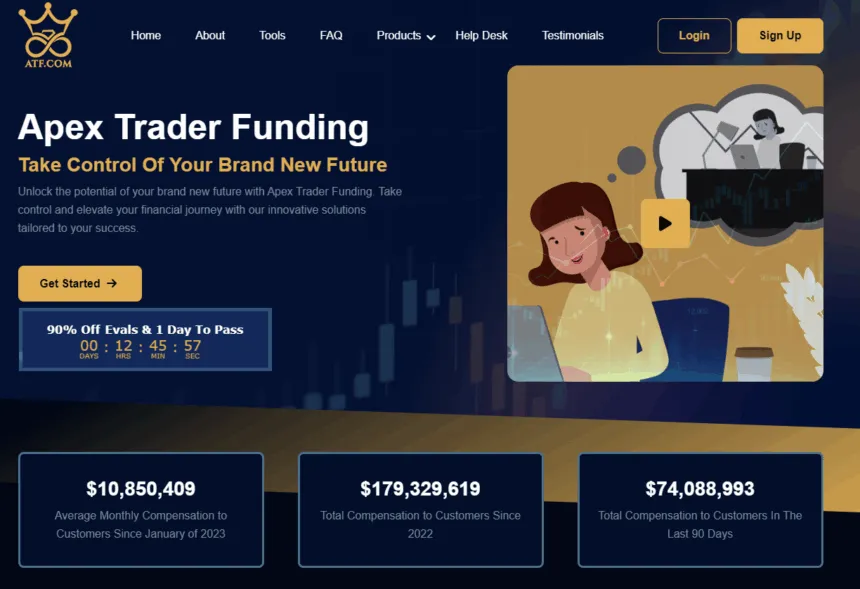
APEX Trader Funding is made for futures traders who want flexibility and a wide range of trading opportunities. Our winner Futures Prop Firm allows traders to engage with multiple futures markets, including commodities like gold and oil, financial indices, and currencies, using various contract types. APEX stands out for its generous contract limits, offering traders the ability to handle up to 35 contracts per trade, which is ideal for those looking to implement aggressive growth strategies. In addition, you can trade up to 20 multiple accounts at one time.
The platform provides real-time market data essential for staying informed on market movements and potential trading opportunities. This data is integrated seamlessly into their trading platforms, which include popular choices like NinjaTrader, known for its extensive analytical tools.
Regarding costs, APEX operates on a subscription model that varies depending on the level of account access and contract size the trader chooses. This fee includes access to all trading platforms offered by APEX with additional charges for market data.
| Feature | Details |
|---|---|
| Challenge | Challenge balance varies from $25,000 to $300,000, with profit requirements changing based on the starting capital. |
| Costs | From $167/month, the monthly fee varies depending on the challenge (Huge rebates of 80% are available) |
| Assets Available | Equity Futures, Currency Futures, Agricultural Futures, Energy Futures, Metal Futures, Micro Futures, Crypto Futures |
| Maximum Position Size | 35 contracts |
| Customer Support | Email, phone number, live chat support. |
| Trading Platforms | Ninja Trader, R Trader, Rithmic, Tradovate, TradingView |
2. The Trading Pit
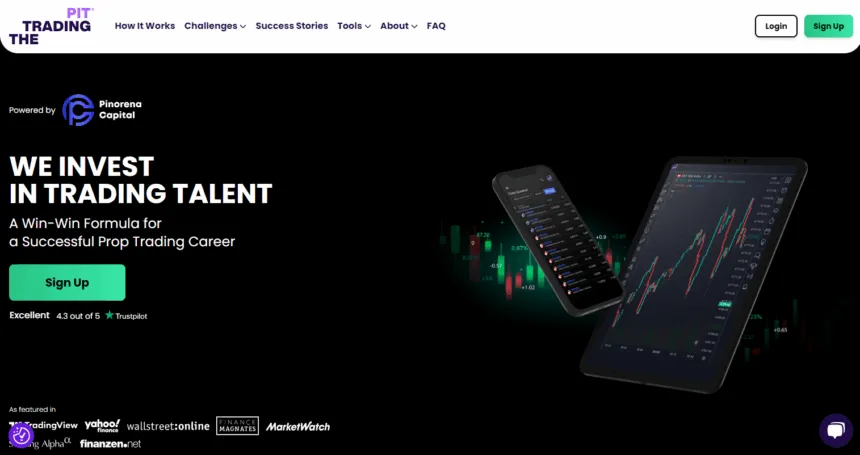
The Trading Pit offers a specialized platform for futures trading and multiple challenges. Each challenge tier has a specific target range and a total duration of 30 days. The firm provides traders with access to a wide array of futures markets, including commodities, indices, and financial instruments. The maximum amount a user can trade varies between challenges. Lite traders can execute 10 micro contracts, and VIP challenge participants can trade up to 10 contracts.
The cost structure at The Trading Pit is straightforward: traders pay an initial assessment fee to qualify for a funded account. Once qualified, there are no recurring monthly fees or hidden charges. However, traders can pay for the futures market data fee, which only applies to scaling plans. Traders are allowed to keep a significant portion of the profits, ranging from 60% to 70%.
The platform is equipped with modern trading tools and analytics, supporting traders in making informed decisions. The Trading Pit offers ATAS, Rithmic, Quantower, and MetaTrader 5. Additionally, The Trading Pit offers educational resources and real-time support to help traders.
| Feature | Details |
|---|---|
| Challenge | Lite – $99: Account balance – $20,000 Standard – $169: Account balance – $150,000 Executive- $349: Account balance – $150,000 VIP – $599: Account balance – $250,000 |
| Costs | From $99, Challenge fee and market data monthly fee |
| Assets Available | Forex, Futures, CFDs, indices, commodities, stock, and crypto. |
| Maximum Position Size | 10 contracts |
| Customer Support | Email, phone number, live chat support. |
| Trading Platforms | ATAS, Rithmic, Quantower, MT4, MT5 |
3. Earn2Trade
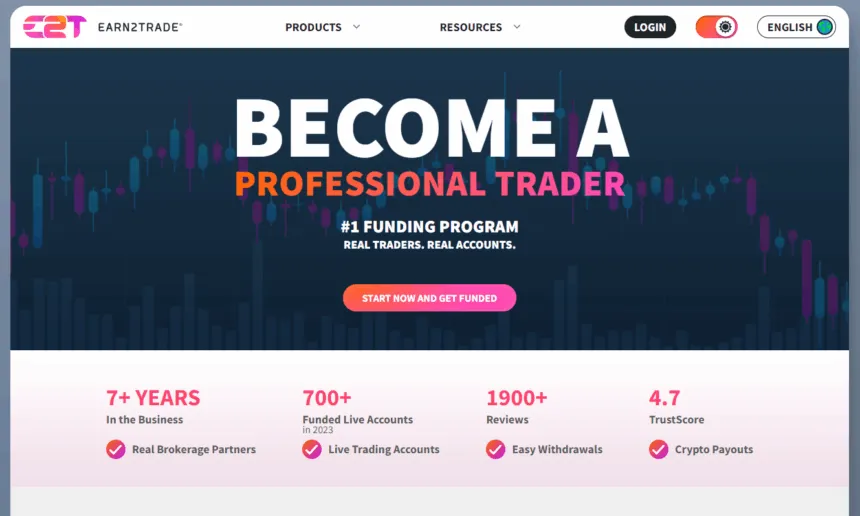
Earn2Trade focuses on educating and qualifying new traders for futures markets. The platform offers a comprehensive educational program called The Trader Career Path, followed by a challenge that traders must complete successfully to qualify for a funded account. Once funded, traders can set positions for up to 16 contracts.
The fee structure includes an upfront monthly cost for the educational course and the trading challenge. Once traders pass the challenge, they receive a funded account with no additional monthly fees, which allows them to focus on trading without worrying about further financial commitments.
Earn2Trade stands out by providing extensive training and real-time trading simulations that help traders with the skills needed to trade futures markets. The blog section covers many trading topics in-depth and is a great place to start before enrolling in a challenge. Also, the platform supports a wide array of futures contracts, enabling traders to diversify their trading strategies.
Furthermore, the comprehensive platform provides the best trading software that is customizable and comes with analytical tools. Some of the platforms provided are Ninja Trader, R Trader Pro, Finamark, MT4, MT5, and C Trader. However, there is a monthly cost to receive the data needed for future trading.
| Feature | Details |
|---|---|
| Challenge | Challenge balance varies from $50,000 to $200,000, with profit requirements changing based on the starting capital. |
| Costs | From $170 per month |
| Assets Available | Equity Futures, Currency Futures, Agricultural Futures, Energy Futures, Metal Futures, Micro Futures, Crypto Futures |
| Maximum Position Size | 16 Contracts |
| Customer Support | Email and live chat support. |
| Trading Platforms | Ninja Trader, R Trader Pro, Finamark, MT4, MT5, C Trader |
4. Leeloo
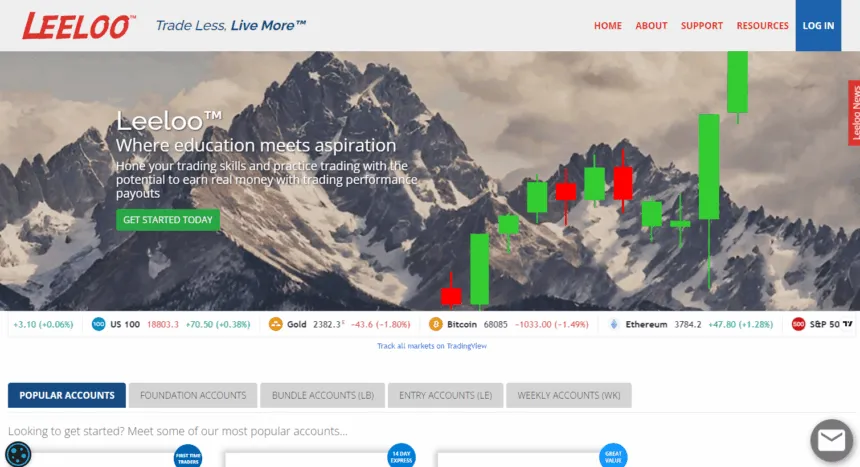
Leeloo focuses on providing straightforward access to a variety of futures markets with an emphasis on simplicity and trader support. Leeloo offers traders the ability to engage in markets ranging from traditional commodities to financial indices, with a flexible approach to contract limits that caters to both novice and experienced traders. Depending on the account type, you can trade up to 300 micros.
Leeloo’s trading platform options include some of the most advanced technologies in the industry, such as TradeStation and Sierra Chart. These platforms are chosen for their analytical tools, real-time data processing, and user-friendly interfaces, which are important for effective trading and strategy implementation.
In terms of costs, Leeloo operates with a unique pricing model. Traders pay a monthly subscription fee that covers the evaluation process, and upon successful completion, they can access higher contract limits and reduced fees.
| Feature | Details |
|---|---|
| Challenge | Challenge balance varies from $25,000 to $250,000, with profit requirements changing based on the starting capital. |
| Costs | From $75 per month |
| Assets Available | Equity Futures, Currency Futures, Agricultural Futures, Energy Futures, Metal Futures, Micro Futures, Crypto Futures |
| Maximum Position Size | 30 Mini Futures, 300 Micro Futures |
| Customer Support | Email, live chat support. |
| Trading Platforms | NinjaTrader 7, NinjaTrader 8, Rithmic Pro, EdgeProX, Motive Wave, ATAS, OptimusFlow, VolFix |
5. TopStepTrader
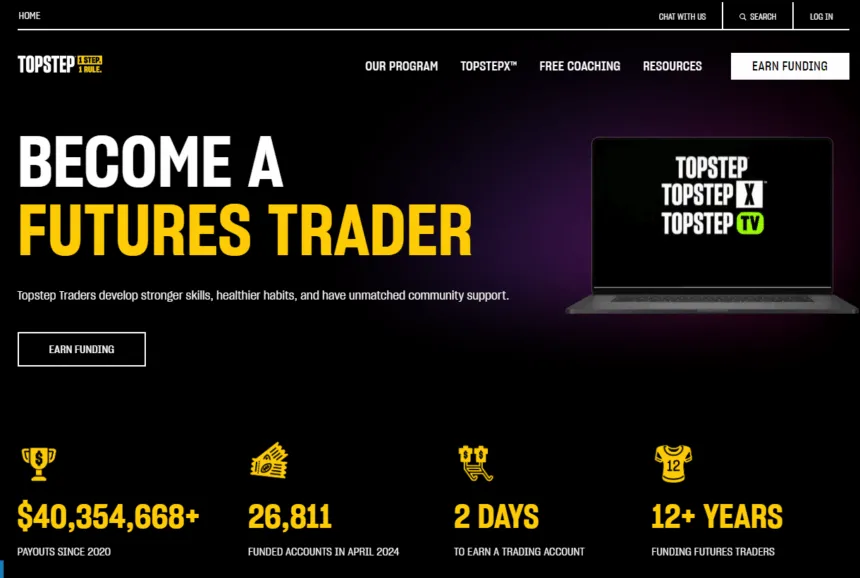
TopStepTrader specializes in identifying and funding futures traders who can demonstrate a high level of skill and profitability in their trading practices. This firm offers a broad spectrum of futures contracts, including major commodities, indices, stocks, and bonds, providing traders with diverse trading opportunities. The maximum position sizes vary from 5 contracts to 15 contracts based on the account type.
TopStepTrader provides a quick two-step evaluation process that can take as little as 2 days where traders must meet specific profit targets while sticking to strict risk management rules.
Once traders pass the Trading Combine, they gain access to a funded account with a minimum of $50,000 buying power. However, there is a one-time $149 activation fee for express-funded accounts upon passing.
The platform options provided by TopStepTrader include some of the most popular futures trading software, such as NinjaTrader, TradingView, and TSTrader. The cost structure at TopStepTrader involves a monthly subscription fee during the Trading Combine, with an additional charge for market data once funded. This straightforward fee system allows traders to focus on enhancing their trading strategies without worrying about incremental costs.
| Feature | Details |
|---|---|
| Challenge | Challenge balance varies from $50,000 to $150,000, with profit requirements changing based on the starting capital. |
| Costs | From $49 per month, data fees level-2 around 7$ |
| Assets Available | Equity Futures, Currency Futures, Agricultural Futures, Energy Futures, Metal Futures, Micro Futures, Crypto Futures |
| Maximum Position Size | 15 contracts |
| Customer Support | Email, live chat, Discord server, and help center. |
| Trading Platforms | TSTrader, Ninja Trader, TradingView, Bookmap X-ray, CTS, DayTradr, InvestorRT, MotiveWave, MultiCharts, R|Trader Pro, Trade Navigator, Volfix.net |
How Does It Work to Trade Futures via a Prop Firm?
Trading futures through a proprietary trading firm involves several key steps. Here’s a basic overview to help beginners understand the process:
- Application and Evaluation: Most prop firms require potential traders to apply and pass an evaluation process. This includes a trading challenge or a series of tests to assess the trader’s capability to manage risk and make profitable trades. The evaluation helps ensure that only skilled traders are given access to the firm’s capital.
- Funding and Account Setup: Once a trader successfully completes the evaluation, they are provided with a funded trading account. The amount of capital allocated can vary significantly depending on the firm’s policies and the trader’s performance during the evaluation phase.
- Trading and Compliance: Traders must adhere to specific trading guidelines set by the prop firm. These might include limits on daily losses, total exposure, and specific markets or products that can be traded. Compliance with these rules is required to maintain an account and funding.
- Profit Sharing: After accounting for any fees, profits from trades are split between the trader and the prop firm according to predetermined percentages. This profit-sharing model is designed to motivate traders to perform well while managing risks effectively. After being profitable in the long term, the prop firm is likely to increase the payout ratio and total trading balance.
- Continued Education and Support: Many prop firms provide ongoing education, trading tools, and support to help traders refine their strategies and stay updated on market conditions. This support is vital for maintaining profitability and growth in trading careers.
Which Trading Platforms Are Available For Futures Prop Firms?
Proprietary trading firms provide their traders with access to specialized trading platforms that are essential for effectively navigating the futures markets. These platforms are chosen for their ease of use, speed, and array of analytical tools.
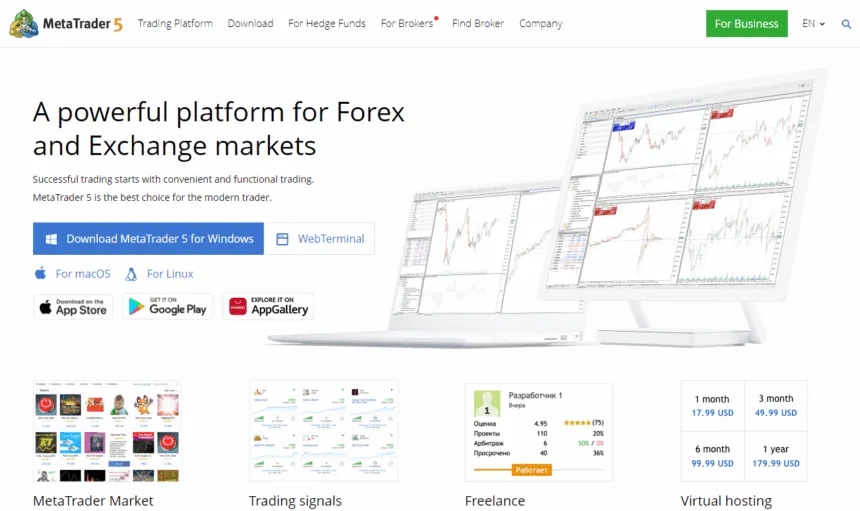
Some of the platforms these prop firms offer are MetaTrader 4, MetaTrader 5, Ninja Trader, R Trader Pro, Finamark, and C Trader. Here’s what sets these platforms apart:
- Advanced Trading Tools: Most platforms come with sophisticated charting packages, technical indicators, and interface customization. These tools are important for analyzing market trends and making informed decisions quickly.
- Real-time Data and Execution: Speed is a big factor in futures trading, and these platforms ensure real-time market data and rapid trade execution. This capability is vital for minimizing slippage in fast-moving markets and executing large volumes of trades efficiently.
- Risk Management Features: Prop firms emphasize risk management to protect their capital. Their platforms usually include features that help traders control losses, such as stop-loss orders, real-time profit and loss tracking, and automated risk controls.
- Multi-Market Access: Trading platforms provided by prop firms offer access to various financial markets. This gives traders opportunities to profit from emerging trends and trade assets that have performed well or predictably in the past.
Trading via Own Futures Account vs Futures Prop Trading Firm
Trading futures through a proprietary trading firm or using your own account each offers unique advantages and challenges. With a prop firm, traders can access significant amounts of capital without needing substantial personal funds. This leverage can amplify potential profits but also requires sharing those profits with the firm.
Additionally, prop firms often provide advanced trading tools, educational resources, and a community of traders, which can be especially beneficial for beginners or those looking to improve their trading skills in a structured environment.
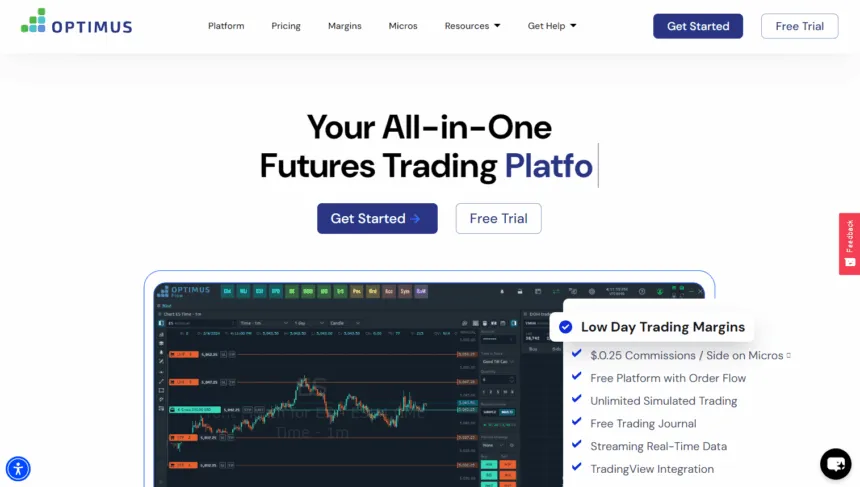
On the other hand, trading via your own futures account offers complete control over trading strategies and operations. Traders retain all profits they generate and have the freedom to trade any markets they choose.
However, this approach requires sufficient capital to meet margin requirements and cover potential losses. It also demands a high level of discipline and knowledge to manage risks effectively without the structured support system that a prop firm provides.
Each option has its trade-offs: prop firms lower the financial barrier to entry and offer support at the cost of profit sharing and some autonomy, whereas personal accounts demand more capital and self-reliance but grant full control and retention of profits. The choice between these options will largely depend on an individual’s capital availability, experience level, and preferred trading style.
| Aspect | Proprietary Trading Firm | Own Futures Account |
|---|---|---|
| Capital Requirement | Lower initial capital needed. | Higher personal capital required. |
| Capital Access | Access to significant trading capital. | Limited to personal funds. |
| Risk Exposure | Firm absorbs some losses. | Full personal risk for losses. |
| Trading Tools | Access to advanced professional tools. | Choice and cost of tools are personal. |
| Education and Training | Structured programs and mentoring are available. | Self-directed learning and development. |
| Community and Support | Built-in community and professional support. | Independent, possibly isolated trading. |
| Profit Sharing | Profits shared with the firm. | No sharing, retain 100% of profits. |
| Trading Autonomy | Some trading decisions are guided by firm’s rules. | Complete autonomy in trading decisions. |
| Market Access | Limited to assets the prop firm allows to trade | Access depends on personal account capabilities. |
| Performance Pressure | Performance metrics and goals set by the firm. | Self-set goals and performance metrics. |
What are Alternatives to Futures Prop Firms?
While futures prop firms offer a unique pathway for traders to access capital and leverage expert resources, there are several alternatives that can suit different trading styles and preferences:
- Instant Funding Programs: These programs provide traders with immediate access to a funded account upon passing a simple verification process without the lengthy evaluation of traditional prop firms. This can be a faster route for experienced traders confident in their trading strategies.
- Forex Prop Firms: Trade up to 300k accounts on currency pairs, commodities, stocks, or indices with high leverage of up to 1:500 on MetaTrader platforms.
- Self-Funding: Traders can opt to use their own capital to trade futures. This approach requires more upfront capital but allows for total control over trading decisions and profits.
- Retail Brokers: Using a retail brokerage account is a common choice for traders who prefer to manage their own investments directly. Retail brokers offer a wide range of futures markets and are regulated, providing a secure environment for trading.
- Trading Competitions: Participating in trading competitions can offer temporary access to larger capital pools based on performance in the competition. Winners often receive trading capital or other financial incentives.
These alternatives provide various levels of independence, risk, and potential reward, making them worth considering for traders evaluating their options outside traditional futures prop firms. Each option has its own set of benefits and limitations, which should be assessed against the trader’s objectives and trading style.
Learn to Trade With WR Trading
However, if you want to expand your knowledge in futures trading or are new to the space and need a mentor, consider joining the WR Trading course. This course goes in-depth into everything a trader needs to know about futures, from proven strategies to the best risk management strategies. Also, you’ll receive personal support and analysis of your trades to help guide you into becoming a better trader.
Conclusion
In summary, selecting a futures prop firm requires evaluating key factors such as profit sharing, support services, and trading platform quality. The five firms discussed – The Trading Pit, APEX, Leeloot, Earn2Trade, and TopStepTrader – offer varied benefits and challenge processes that should be considered before signing up.
Each firm has its unique approach to funding, education, and trader support, which can influence your trading experience and potential success. As you decide, consider how each firm’s specific features align with your trading style, goals, and the level of risk you are comfortable taking.
Frequently Asked Questions on Futures Prop Firms:
What Is a Futures Prop Firm?
A futures prop firm provides traders with capital to trade in exchange for a share of the profits. These firms often offer additional resources like training and technological tools. Traders must complete an evaluation process where they must trade in a virtual setting and hit profit targets before getting funded.
What Are the Benefits of Trading With a Prop Firm?
Trading with a prop firm allows access to greater capital than most individual traders can provide on their own. Prop firms also offer support through education, technology, and a community of traders. This can accelerate learning and potentially increase profitability.
What Are the Typical Fees Associated With Prop Firms?
Prop firms charge an initial evaluation fee. Once traders are funded, there are often no recurring monthly fees; however, profits are shared with the firm. Some firms might also have fees for additional services like receiving market data.
Can I Trade Any Market With a Futures Prop Firm?
Most futures prop firms allow trading across a variety of markets, including commodities, indices, and financial instruments. However, the specific markets available can vary from one firm to another. Traders should check with the firm for their allowed markets and instruments.
How Much of the Profits Do I Get to Keep When Trading With a Prop Firm?
Profit splits vary by firm but typically range from 50% to 90% in favor of the trader. The exact split will depend on the firm’s policies and sometimes the trader’s performance level. Always review the profit-sharing agreement before committing to a firm.








